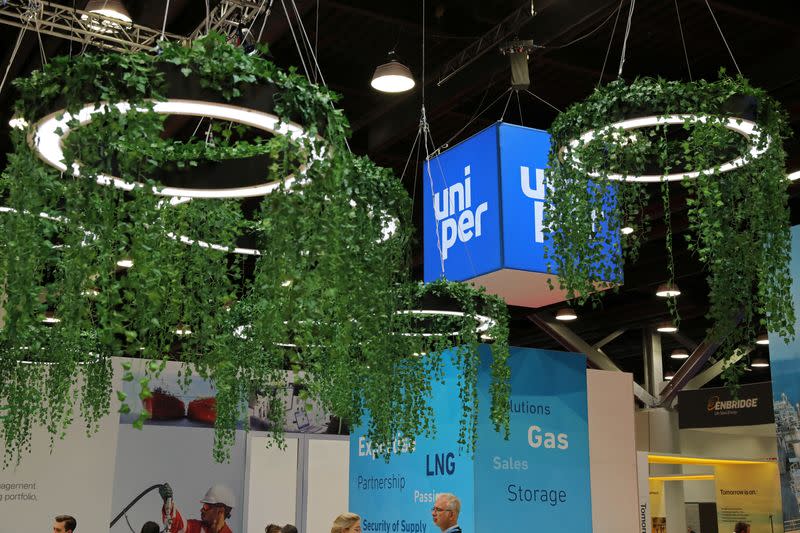Explainer-What's at stake with Uniper's $14 billion arbitration success?

By Christoph Steitz and Nina Chestney
FRANKFURT/LONDON (Reuters) - Uniper this week won a $14 billion arbitration against Gazprom about suspended gas deliveries since 2022, a victory for the German utility that was bailed out during Europe's energy crisis after the Russian firm company stopped supplies.
Below are some of the most pressing questions on the legal implications following the ruling, which was made by an arbitration tribunal in Stockholm on June 7.
WHAT WAS THE CASE ABOUT?
For decades, Russia supplied Germany reliably with gas. This came to an abrupt halt in 2022 following Moscow's invasion of Ukraine, when Gazprom first cut and later suspended deliveries to Uniper, until then the main European recipient of deliveries.
To honour its supply contracts, Uniper bought volumes on the spot market, where Russia's move to curtail deliveries had caused prices to skyrocket.
As a result, Uniper nearly collapsed due to the high costs to buy replacement volumes, causing Berlin to nationalise the utility to safeguard supply of gas to Europe's biggest economy.
Uniper subsequently launched arbitration before a Stockholm tribunal at the end of 2022, blaming Gazprom for its losses.
Gazprom said it had to cut supplies due to faulty gas turbines and sabotage of the now defunct Nord Stream pipeline.
WHAT'S THE VERDICT?
Uniper said the tribunal ruled in accordance with Swiss law and that the decision was legally binding and final, adding that a dispute resolution via arbitration was contractually agreed and had been used by both sides in the past.
While the verdict is not public, Uniper said the decision awarded it a title to claim damages worth more than 13 billion euros ($14 billion) from Gazprom.
It also enabled the German firm, more than 99% now owned by the German government, to cancel 250 terawatt hours of dormant gas contracts with Gazprom, some of which run to the mid-2030s.
This, sources have said, has removed a major investor risk ahead of a Uniper's planned return to the stock market in 2025.
WILL UNIPER GET THE MONEY FROM GAZPROM?
That's quite unlikely.
Gazprom, via its exporting arm, successfully challenged the case in a St Petersburg court, which ruled in March that Uniper and a subsidiary would be fined 14.3 billion euros should they proceed with the arbitration.
Gazprom has so far not replied to a request for comment on this week's ruling.
One possibility could be to seize any Gazprom assets outside Russia, provided the verdict is recognised in all jurisdictions.
One source said Gazprom had no notable foreign assets that could be seized after ditching its German division in 2022, which also had to be nationalised as a result.
Gazprom's subsidiary, called Gazprom International, oversees assets in so-called friendly countries, which have not introduced sanctions against Russia over the war in Ukraine.
Those assets are located in Uzbekistan, Vietnam, Algeria, Libya, Bolivia and Bangladesh.
Even if Uniper were to get any money, it would go straight to the German government as its main owner.
CAN UNIPER SEIZE PAYMENTS TO GAZPROM?
Technically yes. But only in countries that recognise the arbitration tribunal's decision, which would potentially put Germany at odds with its European partners.
Previous titles awarded from other courts already enabled Uniper to exercise claims against Gazprom's Austrian division, causing that business to file for insolvency last year.
"The risk is that if Gazprom does not pay Uniper these damages, buyers who are still receiving Russian gas could be forced to redirect payments due to Gazprom to Uniper instead," ING analysts said in a note.
Austria's OMV, which still gets most of its gas from Gazprom, in late May said supplies from the Russian group could be suspended in connection with a foreign court ruling, that, if enforced, would oblige it to make payments to a major European energy company it did not identify.
A person familiar with the matter said the company in question is Uniper.
Some other European states have already taken action to prevent this.
Hungary, which also gets most of its gas from Russia, last month issued a decree effectively preventing that payments made by state-owned energy conglomerate MVM to Gazprom can be seized, arguing it would put the country's energy supply at risk.
($1 = 0.9341 euros)
(Reporting by Christoph Steitz, Nina Chestney, Boldizsar Gyori, Vladimir Soldatkin and Ron Bousso; editing by David Evans)

 Yahoo Finance
Yahoo Finance 